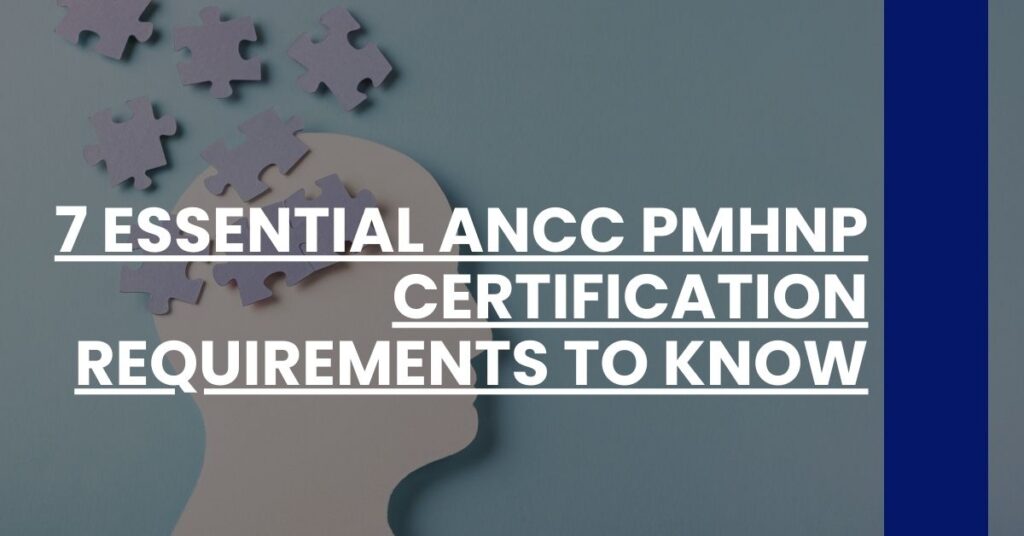Are you on the path to enhancing your mental health nursing expertise with an ANCC PMHNP Certification?
Navigating the strict ANCC PMHNP certification requirements can be daunting, but clarity awaits. This article demystifies the process, outlining the precise steps to ensure your successful credentialing journey without unnecessary jargon, guaranteeing you’re prepared to meet the gold standard in mental health nursing.
- 1. Accredited Educational Background
- 2. ANCC Clinical Practice Hours
- 3. Valid Registered Nurse License
- 4. Application and Fees
- 5. Exam Eligibility Criteria
- 6. Certification Renewal Process
- 7. Continuous Education Criteria
- PMHNP Exam Registration
- PMHNP Exam Outline
- Conclusion: Your Path to ANCC PMHNP Certification
1. Accredited Educational Background
If you’re aspiring to reach the pinnacle of your psychiatric-mental health nursing career, obtaining an ANCC PMHNP certification is a critical move. The journey begins with concrete educational foundations — but not just any education will do. The American Nurses Credentialing Center (ANCC) stipulates stringent ancc pmhnp certification requirements beginning with a degree from an accredited institution. It’s not just about having degrees; it’s about earning them from the right schools.
What does “accredited” mean in this context? Let’s break it down:
- Accreditation Significance: Accreditation ensures that your educational program meets or exceeds the quality standards necessary for your profession. It’s about receiving an education that’s not only respected but recognized for its excellence in preparing you as a competent and ethical psychiatric-mental health nurse practitioner.
- ANCC Recognized Accreditation Bodies: Your degree needs to have the approval seal of the Commission on Collegiate Nursing Education (CCNE), Accreditation Commission for Education in Nursing (ACEN), or the National League for Nursing Commission for Nursing Education Accreditation (NLN CNEA).
- Program Types: The ANCC is looking for candidates who have completed a Master’s, Post-Graduate, or Doctor of Nursing Practice degree with a specialization in Psychiatric-Mental Health Nurse Practitioner.
- School Examples: Institutions such as Case Western Reserve University, University of South Alabama, Yale University, and the University of Florida, hold the distinction of offering accredited programs that meet these rigorous standards.
By fulfilling this foundational requirement, you’re not only inching closer to eligibility for the certification but you’re also setting yourself up for success in a competitive field.
2. ANCC Clinical Practice Hours
Once you’ve ticked off the appropriate education, your next focus should be on clinical practice hours. The ANCC insists on real-world experience, which is why they require a minimum of 500 faculty-supervised clinical hours in your PMHNP program. This isn’t busy work; this is a fundamental aspect of your professional development.
- Supervised Hours’ Purpose: Such a robust number of hours under the guidance of qualified professionals ensures that your practical skills are sharp and your theoretical knowledge is applied effectively in real patient care scenarios.
- Documentation: Keep meticulous records of these hours, as you will be required to provide evidence of them when you apply for the certification exam.
Remember that these hours are crucial not only for ticking off an item on the ANCC PMHNP certification requirements list but also for equipping you with the skills necessary to excel in your future role as a PMHNP.
3. Valid Registered Nurse License
An active, unencumbered Registered Nurse (RN) license is the bedrock of your certification. Think of it as your passport to the realm of advanced practice nursing.
- Validity Across States: Ensure that your license is valid in the state where you are practicing. This means that if you’re planning to take the PMHNP exam, your RN license should be without disciplinary actions and in good standing.
- Transcending Boundaries: While state-by-state requirements may differ slightly, the ANCC standards remain constant. An active RN license is the key that unlocks the door to PMHNP certification eligibility, no matter where you earned it.
This isn’t just another hoop to jump through. Maintaining an active RN license is a declaration of your continued competence and dedication to the highest standards of nursing practice.
4. Application and Fees
When it comes to applying for your ANCC PMHNP certification, attention to detail is everything. The process involves precise steps and clear financial commitments.
- Application Nuances: Begin by submitting a complete application that includes your transcripts showing that you’ve met the educational prerequisites. Don’t forget to also include proof of your supervised clinical hours and a copy of your RN license.
- Fees Breakdown: Anticipate an investment in your future. Fees can range anywhere from $220 to $395 for initial certification, while renewals will run you from $250 to $375 according to the ANCC.
View these fees not as a roadblock but as a stepping stone toward realizing your professional goals. This is where all your hard work starts to come together, culminating in your eligibility to sit for the ANCC PMHNP exam.
5. Exam Eligibility Criteria
Now that we’ve covered educational background, practice hours, licensing, and application logistics, let’s delve into the meat of the ANCC PMHNP certification requirements — the eligibility criteria for the certification exam. This is where the ANCC confirms that you’ve got all your ducks in a row, ready to prove your mettle.
- Degrees and Licenses: You’re expected to present an active RN license and an advanced degree from an accredited educational institution focused on psychiatric-mental health practice.
- Clinical Practice: Those pivotal 500 supervised clinical hours we discussed earlier will need verification to prove you have hands-on experience in the field.
- APRN Core Courses: Completion of Advanced Practice Registered Nurse (APRN) core courses is non-negotiable. This includes advanced health assessment, advanced pathophysiology, and advanced pharmacology according to the ANCC criteria.
Each of these elements is essential not only to meet the ANCC’s stringent standards but more importantly, to ensure you are fully prepared for the responsibilities that come with being a certified PMHNP.
6. Certification Renewal Process
Staying at the top of your profession is an ongoing process, and the ANCC PMHNP certification is no exception. To ensure that you continue to provide the highest level of psychiatric care, the ANCC has laid out a certification renewal process that is both a commitment to lifelong learning and an affirmation of your dedication to your practice.
- Renewal Timeframe: Every five years, your certification is due for renewal. It might seem far away now, but time flies when you’re making strides in your career.
- CE Requirements: A sharp mind necessitates continuous education. For renewal, you require at least 75 continuing education hours. Specifically, 25 of those hours must be in pharmacology to stay updated on medication management—an area of constant innovation and change.
- Professional Development: Ticking off categories in professional development is part of the renewal process. This might include presentations, publications, or preceptor hours, showcasing multifaceted expertise beyond clinical practice.
- Clinical Practice Hours: You also have the option to combine your educational activities with demonstrated practice hours—a minimum of 1,000 hours in your specialty area—to meet recertification standards.
- Renewal Fees: The costs remain part of the equation. Renewal fees are set at $200 for ANA members or $350 for non-members according to ANCC guidelines. Upon submitting your documentation and payment, the cycle begins anew, ready for another five years of professional growth and patient care excellence.
7. Continuous Education Criteria
Your journey as a psychiatric-mental health nurse practitioner (PMHNP) doesn’t end with certification. The continuous education criteria challenge and invigorate your practice, ensuring that you’re at the forefront of psychiatric care innovation.
- Expanding Knowledge: The advancing field of mental health means there’s always something new to learn. You’ll need a minimum of 75 contact hours every five years to renew your certification.
- Targeted Learning: Delve deep into your specialty with targeted education. It’s a chance to expand your proficiency and, in doing so, enhance your clinical practice. Specialty organizations like the American Psychiatric Nurses Association offer accredited programs that may satisfy your continuing education requirements.
- Lifelong Commitment: Meeting the ANCC’s continuous education criteria is a testament to your lifelong commitment to your patients and your profession. It symbolizes your willingness to grow, adapt, and improve as healthcare and society evolve.
PMHNP Exam Registration
The logistics of exam registration may not be the most exciting aspect of meeting the ANCC PMHNP certification requirements, but it’s a critical step in reaching your goal.
- Start with Preparation: Before diving into registration, ensure all prerequisites are completed—your application won’t progress without them.
- Gather Documents: Have your transcripts, proof of clinical hours, and your active RN license at the ready. These pieces of evidence are non-negotiable.
- Navigate the Portal: The ANCC website is your portal to registration. Create your account, upload your documents, and fill out the application form with diligence and care.
- Schedule Wisely: Once your application is approved, schedule your exam through Prometric. Choose a date that gives you ample time to prepare without leaving too much time for nerves to build.
PMHNP Exam Outline
Understanding the layout of the exam can give you a strategic edge. It’s crucial to grasp the PMHNP exam outline to allocate your study time effectively.
- Question Breakdown: Know that the exam comprises 175 questions covering various domains of psychiatric-mental health practice. Every question you face is a step towards your certification.
- Content Areas: The exam touches upon diverse topics such as foundations of advanced practice nursing, psychotherapy, and psychopharmacology. Keep abreast of updates to the ANCC PMHNP exam, including new content domains and revisions.
- Age Group Emphasis: Your expertise must span across the lifecycle. From child and adolescent to geriatric care, your proficiency will be tested with scenarios from various age groups.
Delving deep into the PMHNP exam content not only strategically positions you for success but also nourishes your clinical proficiency for the future.
Conclusion: Your Path to ANCC PMHNP Certification
Setting your sights on the ANCC PMHNP certification might seem like a high mountain to climb. But consider each requirement—every course taken, every hour spent in clinical practice, every document meticulously collected—as a stepping stone leading to professional excellence.
These requirements are not merely hurdles but benchmarks of proficiency, integrity, and commitment to the ever-evolving field of psychiatric-mental health. By fulfilling the ANCC PMHNP certification requirements, you are making a robust statement: that you are equipped, empowered, and unwaveringly dedicated to advancing mental health care.
So embrace the challenge, engage with the process, and embark on a gratifying journey that enhances not only your career but the lives of those you will touch with your expertise and compassion. The path to ANCC PMHNP certification is rigorous, yes, but it’s one that shapes you into a healthcare professional of unparalleled distinction.

